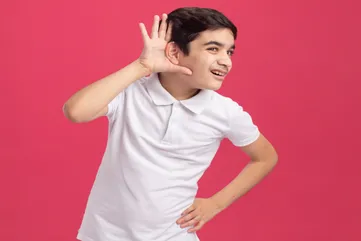Conflict Resolution
Conflict resolution involves managing disagreements constructively through communication, compromise, and problem-solving rather than avoidance or aggression.
Why teens struggle with conflict resolution
Adolescent brain development makes conflict resolution particularly challenging, with emotional intensity often overwhelming rational problem-solving abilities.
Common teen conflict challenges:
• All-or-nothing thinking escalating disagreements
• Taking everything personally
• Difficulty seeing others' perspectives
• Emotional flooding preventing rational discussion
• Social media complicating and amplifying conflicts
• Limited experience with healthy resolution
Without conflict resolution skills, teens either explode destructively or avoid necessary confrontations.
You're not alone
If your teen's friendships cycle through intense drama, or family dinners become battlegrounds over minor issues, you're experiencing normal adolescent conflict challenges. Many parents feel like constant mediators or watch helplessly as their teen struggles with peer disputes. The teenage intensity that makes conflicts explosive also makes resolution feel impossible. Families who develop conflict resolution skills together report not just less fighting but deeper relationships and better problem-solving.
What it looks like day to day
Student
Your teen learns to say "I need a break to cool down" during arguments instead of saying hurtful things they'll regret.
Parent
You model conflict resolution by acknowledging your teen's perspective even when disagreeing, showing that understanding doesn't require agreement.
Tiny steps to try
Teach conflict resolution through modeling and structured practice.
- 1
Cooling-off protocols
Establish family rules about taking breaks when emotions escalate. Return to discuss when everyone's calm.
- 2
I-statements practice
Replace "You always..." with "I feel... when..." to reduce defensiveness and express needs clearly.
- 3
Perspective-taking exercises
After conflicts, explore each person's viewpoint. "What do you think they were feeling?" builds empathy.
- 4
Win-win seeking
Brainstorm solutions benefiting everyone rather than zero-sum victories. [Collaborative approaches](/the-parent-bit/deep-play-helps-teenagers-learn) strengthen relationships.
- 5
Repair modeling
Show how to apologize genuinely and make amends. Conflict recovery matters as much as prevention.
Why conflict resolution skills matter
Conflict resolution abilities predict success in relationships, academics, and careers. Research shows that individuals with strong conflict resolution skills report higher life satisfaction, better mental health, and more stable relationships.
The teenage years provide crucial practice for adult conflict management. Adolescents who learn constructive conflict resolution show lower rates of relationship violence, better college roommate relationships, and improved workplace dynamics. These skills particularly benefit teens with ADHD or anxiety, who may struggle more with emotional regulation during conflicts.
Johnson and Johnson (2015) found that students trained in conflict resolution showed 35% improvement in academic achievement and 40% reduction in disciplinary problems. Deutsch (2014) demonstrated that constructive conflict resolution skills in adolescence predict positive adult relationships and career success.
References
Deutsch, M. (2014). The resolution of conflict: Constructive and destructive processes. Yale University Press.
Johnson, D. W., & Johnson, R. T. (2015). Teaching students to be peacemakers: Results of twelve years of research. Peace and Conflict: Journal of Peace Psychology, 21(4), 417-438.
Ready to help your teen thrive?
Get personalized 1-on-1 coaching to build better habits and boost grades. Join 10,000+ families who trust Coachbit.
Frequently Asked Questions
Should we intervene in peer conflicts or let teens handle them?
Balance support with independence. For minor conflicts, coach from the sidelines: "What are your options?" For serious issues involving safety or bullying, intervene directly. Teach the difference between healthy conflict and harmful behavior. Most peer conflicts benefit from adult coaching rather than direct intervention, building skills while ensuring safety.
What if our teen refuses to engage in conflict resolution?
Avoidance is a conflict style, often stemming from fear or past negative experiences. Don't force immediate resolution. Start by validating their feelings and exploring why they avoid conflict. Build skills during calm moments through hypothetical scenarios. Model healthy conflict resolution in your own relationships. Sometimes teens need to see conflicts resolved successfully before risking engagement themselves.
Related Terms
Emotional Regulation
Emotional regulation is your teen's ability to manage and respond to feelings in healthy ways, even when emotions feel overwhelming or out of control.
Social Skills
Social skills are the abilities needed to communicate, interact, and build relationships with others effectively, including reading social cues, showing empathy, and following social norms.
Related Articles

Deep Play Helps Teenagers Learn
Purposeful or 'Deep Play' is more than entertainment. Neuroscience shows that play is pivotal to learning, creativity and problem-solving in teenagers.
Read article
3 Ways an Executive Functioning Coach Can Help Your Child
Discover why executive functioning skills are crucial for your child's success. Learn how an executive functioning coach can make a difference
Read article
Science Explains Why Your Teen Won’t Listen to You: 4 Ways to Respond
Science shows that at 13, teens no longer listen to their parents and prioritize outside voices. A life coach or mentor is a great external source of support.
Read article
